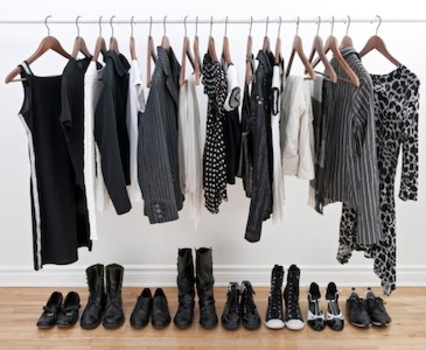This originally appeared on The Daily Life. Republished here with permission.
Dressing down made me feel safer. Not only could I avoid male attention I couldn’t handle, but I avoided the competitive gaze of other women.
For some time now, I’ve not felt like a “proper woman” when it comes to outfits. All around me I see “put-together” women who know how to match shoes to skirts to fancy tops, and I know that somewhere along the line I opted to for safety rather than chutzpah.
My own “dowdification,” the fine art of dressing down, began after my family moved to a very white, very middle-class suburb. Once upon a time I’d happily rocked the loud thrift shop skirts my mother bought with bright red tights and hand-me-down patent leather shoes. But on arrival at “Stepford Primary School,” the Queen Bee of Grade Five gave me a daily fashion re-education.
Lesson 1. Never show pride. (“You must think you’re so special with those shiny loud shoes.”)
Lesson 2. There is only one color: muted. (“Don’t you know that pink and red don’t go?”)
I finally saved up enough pocket money for a trip to Just Jeans and never looked back.
I know I’m not alone in hiding my sartorial light under a bushel. But what surprised me, after a quick survey among friends, was how much people “dowdify” for others—and how much their weight plays a part.
“When I was 40 pounds heavier, I thought I had to deny my femininity,” said Veronica, a medical researcher. “Inside, I desperately wanted acceptance…but outside I didn’t look like the woman I thought I was supposed to be. I was afraid if I wore something pink, for example, people would say ‘who are you to be feminine? You’re not a ‘proper woman’.”
It seems that “dowdifying” is not just a fluffy sartorial issue, but a complex psychological one. And while there are many and varied rationales for doing so, the one unifying feature is safety. While Veronica dowdified as a way to apologize for her weight and escape ridicule, others dress down to avoid what they see as “offending” others by standing out.
In my early 20s, I noticed that other women were often stand-offish unless I made super-human effort to show that I was not a threat. It didn’t help that I’m very tall, so the effect of whatever I wore was exacerbated. Eventually it seemed easier to just dress a little bit “less than” so others felt more comfortable, rather than going in guns blazing and having people say “Who does she think she is?”
Dressing down made me feel safer. Not only could I avoid male attention I couldn’t handle, but I avoided the competitive gaze of other women. In my rationale, dowdifying meant people would like me more.
But for yoga teacher Donna, who doesn’t believe in dressing down, this attitude smacks of egotism. “Not making an effort is a kind of arrogance,” she says. “It’s saying that in some way we believe we’re better than others and if we show up, they’ll be threatened by us.” In other words, “dowdifying” can be like a reverse status symbol. The statement being not so much “Check me out, I have the legs for this mini,” but “I’m so gorgeous I can get away with dressing like an ’80s accountant.”
Curiously, the “Who do you think you are” syndrome doesn’t just affect women. My partner (a gamer, never far from a hoodie and a console) recently went to Italy, and started taking a shine to tailored shirts and designer jeans during the trip. “How long did it take you to want to dress like that?” I asked him. (After all, this is a man who has a deep suspicion of collars.) “After arrival?” he asked. “About 20 minutes. But it’s different over there; people dress up just to walk down the street. If you don’t, people look at you like you’ve got no self-respect.” Sadly, the Italian tailoring didn’t last back at home. You’d get called out for being “stuck up” for making too much of an effort here.
What struck me in the photos from Italy was that people did not look stuck up. They looked proud. From the street sweepers to the baristas, it was a pride that seemed elevating, not arrogant. When my partner returned to work in the non-threatening hoodies and sneakers of his colleagues, part of me felt sad. I realized that when we dress down, presumably to make others feel better, we all lose out as life becomes a little more colorless.
Donna is right, there is an arrogance in dowdifying. Looking at the hipsters on my train, I realize we probably spend just as much on our carefully understated outfits of charcoal and steel as the “show ponies” we ridicule, and have less fun doing it.
When I think of the women whose style I admire, there’s no defining trend; no Kate Middleton-inspired waistline, nothing you could quantify in Vogue. Yet there are rules. Whether it’s cut-offs and heels, or a strapless gown and denim jacket, these women 1. Dress unapologetically. 2. Dress in a way that feels good to them.
It’s called chutzpah. Respect.
Alice Williams is an author and yoga teacher. She tutors in media writing at the University of Melbourne and blogs at Alice-williams.com @Alicewillalice
Related Links:

